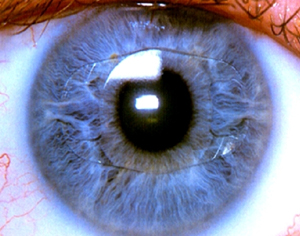Intraocular Lens Implant
Some people who are interested in getting rid of their glasses are not suitable laser surgery candidates for many reasons, including: thin corneas, cornea distortion, or very strong prescriptions.
 Advanced medical technology offers these people an alternative solution – an intraocular artificial lens implant that is adapted to the patient's visual impairment. Although the lens is permanently implanted, it is nevertheless removable and exchangeable should the need arise.
Advanced medical technology offers these people an alternative solution – an intraocular artificial lens implant that is adapted to the patient's visual impairment. Although the lens is permanently implanted, it is nevertheless removable and exchangeable should the need arise.
Before undergoing an intraocular lens implant, it is necessary to undergo a comprehensive series of examinations to determine the eye structure's compatibility and the normalcy of the cornea and retina; as well as various photos and additional examinations that also verify suitability for laser surgery. After the patient's suitability for this type of surgery has been determined, a suitable lens is ordered according to the patient's eye data. This surgery offers an alternative solution to improve vision – an artificial lens that is permanently implanted within the eye. The lens provides a solution for severe nearsightedness, severe farsightedness, and astigmatism, and the results of this method are more precise.
How is the implant performed?
At the preliminary examinations, a new lens that will properly correct the problem is ordered. During the course of the surgery, which lasts about 20 minutes, the lens is implanted through a miniature opening and is placed between the natural lens of the eye and the iris, or above the iris, depending on the type of lens.
The surgery, which is performed in outpatient surgery center conditions in the Enaim operating room, enables the patient to return home immediately afterward. If both eyes need implants, surgery is performed first in one eye and then in the second eye two weeks to a month later.
What are the advantages of the lens?
The lens implant procedure is safe. It is supported by much long-term accumulated clinical experience, and the results can be predicted in advance. If necessary, the lens may be removed or exchanged. The patient can enjoy optimal vision and a permanent solution. There is no need for maintenance, and the result is achieved almost immediately. Most patients can return to their regular activities within a few days. The lens implant is suitable to correct both moderate and severe visual impairment.
Who is a suitable candidate for this surgery?
Patients aged 18-55 who are in good health, without eye diseases and with a stable prescription number that has not changed for the past year at least. Numbers (diopters) in lenses should be between -3 and -24 for nearsighted patients; and between +1 and +12 in farsighted patients. Your optimal solution will be decided at the compatibility examination.